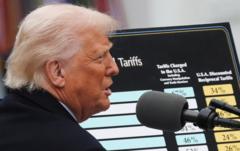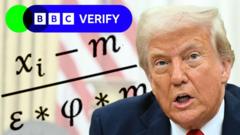During a recent Rose Garden event, Trump announced significant new tariffs targeting various countries, claiming it's essential for American economic revival, while facing criticism that it could lead to an economic downturn and strained international relations.
Trump's Historical Tariff Announcement: A Defining Moment or a Risky Gamble?

Trump's Historical Tariff Announcement: A Defining Moment or a Risky Gamble?
President Trump unveils sweeping tariffs, taking a bold stance on trade that could reshape the U.S. economy and global relations.
In a dramatic move reflective of his longstanding commitment to protectionist trade policies, President Donald Trump unveiled a series of sweeping tariffs during an event at the White House's Rose Garden. Marking a significant chapter in his presidency, this announcement is seen as a culmination of decades of Trump advocating for tariffs as a means to strengthen the U.S. economy.
Surrounded by supporters, key political figures, and cabinet members, Trump’s address celebrated his vision of a new trade landscape, framing it as a return to the "America First" ideology he has championed since taking office. Drawing from his historical criticisms of free trade agreements like Nafta and the World Trade Organization, Trump was enthusiastic about the prospect of implementing tariffs ranging up to 50% on what he termed the "worst offenders" of global trade practices.
Acknowledging impending opposition from "globalists" and "special interests," the president maintained that he was confident in his approach, asserting that previous predictions of negative outcomes from such policies have consistently proven erroneous. He emphasized that hardworking Americans have suffered while other nations prospered at their expense, reinforcing the idea that these tariffs would restore prosperity and competitiveness.
However, this substantial move is not without its risks. Economists across the spectrum have raised alarming concerns about the potential repercussions of such high tariffs — which include a 53% tax on China and 20% on the EU and South Korea — warning that these costs might eventually be passed down to American consumers, potentially igniting inflation and even steering the U.S. economy towards recession. Notably, former International Monetary Fund chief economist Ken Rogoff underscored the gravity of the situation, likening the tariffs to dropping a "nuclear bomb" on the global trading system.
The fallout from these tariffs may strain America's relationships with traditional allies, particularly as countries like Japan and South Korea express intentions to collaborate against the U.S. policies that threaten their own economic interests. Yet Trump's long-term vision includes transforming the American manufacturing landscape, fostering self-reliance, and seeking to erect robust protections against future global economic disruptions — ideas that critics dismiss as overly optimistic.
As Trump steers his administration toward what he labels as the “liberation day” for the American economy, the implications of this tariff strategy cast a long shadow over his legacy. His supporters cheered the announcement, while detractors prepared for potential economic fallout. Ultimately, this declaration may herald either a transformative legacy or an infamous chapter in American economic history, leaving many to ponder the question: will this mark the beginning of a new era of trade, or the onset of unprecedented economic challenges?
Surrounded by supporters, key political figures, and cabinet members, Trump’s address celebrated his vision of a new trade landscape, framing it as a return to the "America First" ideology he has championed since taking office. Drawing from his historical criticisms of free trade agreements like Nafta and the World Trade Organization, Trump was enthusiastic about the prospect of implementing tariffs ranging up to 50% on what he termed the "worst offenders" of global trade practices.
Acknowledging impending opposition from "globalists" and "special interests," the president maintained that he was confident in his approach, asserting that previous predictions of negative outcomes from such policies have consistently proven erroneous. He emphasized that hardworking Americans have suffered while other nations prospered at their expense, reinforcing the idea that these tariffs would restore prosperity and competitiveness.
However, this substantial move is not without its risks. Economists across the spectrum have raised alarming concerns about the potential repercussions of such high tariffs — which include a 53% tax on China and 20% on the EU and South Korea — warning that these costs might eventually be passed down to American consumers, potentially igniting inflation and even steering the U.S. economy towards recession. Notably, former International Monetary Fund chief economist Ken Rogoff underscored the gravity of the situation, likening the tariffs to dropping a "nuclear bomb" on the global trading system.
The fallout from these tariffs may strain America's relationships with traditional allies, particularly as countries like Japan and South Korea express intentions to collaborate against the U.S. policies that threaten their own economic interests. Yet Trump's long-term vision includes transforming the American manufacturing landscape, fostering self-reliance, and seeking to erect robust protections against future global economic disruptions — ideas that critics dismiss as overly optimistic.
As Trump steers his administration toward what he labels as the “liberation day” for the American economy, the implications of this tariff strategy cast a long shadow over his legacy. His supporters cheered the announcement, while detractors prepared for potential economic fallout. Ultimately, this declaration may herald either a transformative legacy or an infamous chapter in American economic history, leaving many to ponder the question: will this mark the beginning of a new era of trade, or the onset of unprecedented economic challenges?






















